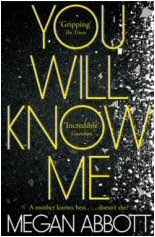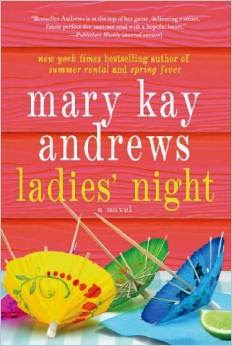Megan Abbott in the Spotlight: You Will Know Me
 I am
currently reading this novel You Will Know Me.
This novel so far has been an easy read!
I look forward to sharing it soon!
How many of you are prepared for the Olympics. What is your favorite sport? Is it womens' gymnastics? Then I have a novel for you! You Will Know Me
by Megan Abbott is her latest novel. She has stopped by Writer's Corner to
share.
I am
currently reading this novel You Will Know Me.
This novel so far has been an easy read!
I look forward to sharing it soon!
How many of you are prepared for the Olympics. What is your favorite sport? Is it womens' gymnastics? Then I have a novel for you! You Will Know Me
by Megan Abbott is her latest novel. She has stopped by Writer's Corner to
share.
What was the
inspiration for You Will Know Me?
I’ve always
been interested in families of prodigies. How power operates in those families,
how ambition does. Then, during the London Olympics four years ago, I saw this
video of the parents of American gymnast Aly Raisman watching their daughter’s
uneven bar routine and it kind of blew me away. They were so invested in it, so
connected to her. They moved as she moved. They knew every beat of the
performance. The footage went viral and the response to it was tricky. Some
people found it funny, others found it problematic and there was some finger
pointing. I think we all struggle with how invested parents should be in their
children’s development, but with exceptionally talented children, all that is
thrown into high relief.
I could just
feel the book taking shape after that. How does that kind of intense focus on a
child’s talent affect a marriage, for instance? What about siblings? And
families in general fascinate me—the place of the greatest darkness and the
greatest light.
You are
known for writing shockingly accurate portrayals of teen angst and an uncanny
ability to get inside the heads of teen girls. Why are you so drawn to this
subject matter?
In some ways
because teen girls are still so often dismissed or condescended to. But every
woman I know is haunted in some ways by their teen years, by the choices they
made then and the way they crafted their identity and developed their sense of
self.
And, as a
writer, it’s such rich terrain. Everything is in such high relief during those
years. All the big emotions of life seem to storm through us every day. When I
remember myself at that age, it was like my nerve endings were all exposed.
It’s when you’re both at your most curious (and, potentially, risk-taking) and
also at your most vulnerable—especially to disillusionment. And when you’re a
mom, like the main character in You Will Know Me, you’re in some ways living
through it all again through your daughter, which is incredibly complicated.
You Will
Know Me is a bit of a departure in that it focuses more on the parents’
perspective. Why did you choose to shift gears in this way?
My last
book, The Fever, had three viewpoints, one of whom was the father of two teens,
and I really loved it. Exploring the gap between how parents view their teens
and how teens view themselves, and vice versa. But it seemed thrillingly
different in the case of You Will Know Me. Katie, the protagonist, is so close
to her daughter, Devon, because of the way the family has circled itself around
Devon’s extraordinary talent. And that closeness fascinates me.
At what
point does your child become a stranger to you? Because all children need to
break apart from you to become themselves, but is it slower to happen in the
case of a prodigy? A case when the parent, like Katie, is so tied up in her
daughter’s everyday life?
What
research did you do into the world of uber-competitive youth gymnastics when
writing You Will Know Me?
Gymnast
memoirs were a huge help. I read almost every one I could get my hands on. Both
the flag-waving sports ones and the tougher ones too, the exposés. The one that
had the biggest impact for me was Nadia Comaneci’s Letters to a Young Gymnast,
which is a brilliant book on many levels (foremost her strong voice), and is
such a keen distillation of what seems a pure, fire-hardened ambition. I also
talked to former gymnasts and had one of them read the manuscript.
And, I
confess, watching a lot of YouTube, and diving into online chat rooms,
especially those devoted to parents of gymnasts. But the book’s title comes
from Nadia, who tells her reader, “I don’t know you, but you will know me.”
What could be more enticing to a reader?
What did you
learn about this world that surprised you?
Everything!
I became very fixated on the mental control and struggles the gymnasts faced.
How much it is a head game. And then the sport’s impact on girls’ developing
bodies. It is not a universal experience, but for many girls it halts their
adolescence in certain ways, or it threatens to, and this prospect fascinated
me and worked its way into the novel. Your body is both your greatest gift and
your worst enemy. Maybe we all feel that, in a way.
Have any
gymnasts or parents of youth athletes read and responded to You Will Know Me
yet?
I’ve had a
few early gymnast readers who’ve been very supportive. In particular, they’ve
responded to the parent-booster culture in the book, the way parents invest in
a gym and insert themselves into gym politics. The hothouse environment that
the parent viewing area can take on. Or, “gym drama,” as it’s called. Which
seems to have all the hallmarks of a great reality TV show, or a Shakespearean
play.
After being
so close to this world while researching and writing You Will Know Me, will you
view the Olympics in Rio this year through a different lens?
I love
watching gymnastics and this book reflects a love of, and immense respect for,
the sport and the art. But in the end, I think the book is more about family
and parent love than gymnastics, so probably my eyes will be more on the
families than in past years. More on what it takes for a family to help make an
Olympic medalist.
You’re
working on TV scripts for your novels Dare Me (for HBO) and The Fever (for
TNT). What is it like to adapt your own work for the small screen?
As much as
people like to say that TV is the new novel, the two are so very different. By
the time you sell it, it’s changed so much from the book—the world has gotten
so much larger, you’ve had to create ways to make the story possibilities
expand indefinitely—you lose all vanity about your own book. Instead, it’s
something entirely new. But the biggest difference is how collaborative it is.
Writing a novel, until the last stretch, is utterly solitary. Writing for TV is
a cacophony of voices. Sometimes noisy, but never, ever lonely!
You recently
joined the writing staff of David Simon’s (“The Wire”) new HBO drama “The
Deuce.” How does that work differ from writing a novel? How did your career in
fiction inform your work in the writers’ room? When can we see “The Deuce?”
Different in
every way. I’d say apples and oranges, but maybe it’s more like apples and a
large, cunning mountain lion! As collaborative as developing your work for TV
is, being on staff for a show in production is a thousand times more so. You’re
there to help in every way you can to bring the showrunners’ ideas to life. I
think there are so many crime novelists writing for TV now because we bring a
certain facility with plotting, but in the end what’s most exciting in the
writers’ room is how different everyone is, how differently we see the world,
and yet how we all value the same things: character, story, meaning.
And “The
Deuce,” which stars James Franco and Maggie Gyllenhaal, will be on HBO next
year. I’ve seen the pilot, and it’s incredible.
Do you have
time to work on another book with all of your TV project in the works? What’s
next and when from Megan Abbott?
Somehow, I
do! I have a new novel in the works called Give Me Your Hand, which will come
out in 2018, I think. It’s about two ambitious female scientists who share a
secret from their past. Very Hitchcock-inspired, this one.
About the
Author:
Megan Abbott
is the Edgar®-winning author of the novels Queenpin, The Song Is You, Die a
Little, Bury Me Deep, The End of Everything, Dare Me, and The Fever, which was
chosen as one of the Best Books of the Summer by the New York Times, People
Magazine and Entertainment Weekly and one of the Best Books of the Year by
Amazon, National Public Radio, the Boston Globe and the Los Angeles Times.
Her writing
has appeared in the New York Times, Salon, the Guardian, Wall Street Journal,
the Los Angeles Times Magazine, The Believer and the Los Angeles Review of
Books.
Born in the
Detroit area, she graduated from the University of Michigan and received her
Ph.D. in English and American literature from New York University. She has
taught at NYU, the State University of New York and the New School University.
In 2013-14, she served as the John Grisham Writer in Residence at Ole Miss.
She is also
the author of a nonfiction book, The Street Was Mine: White Masculinity in
Hardboiled Fiction and Film Noir, and the editor of A Hell of a Woman, an
anthology of female crime fiction. She has been nominated for many awards,
including three Edgar® Awards, Hammett Prize, the Shirley Jackson Prize, the
Los Angeles Times Book Prize and the Folio Prize.
Please visit
Megan on her Facebook page, Twitter, and her Website.
Please visit
these fine retailers:




Comments
Post a Comment